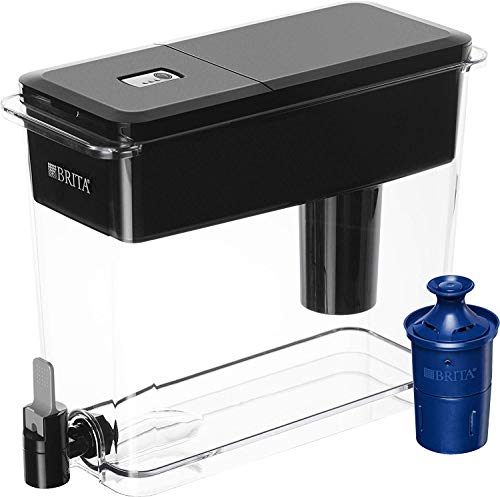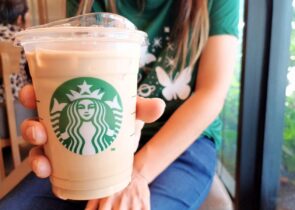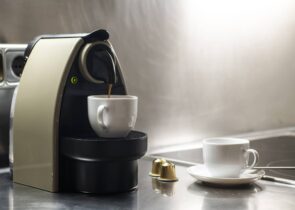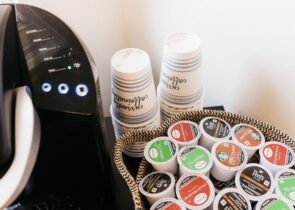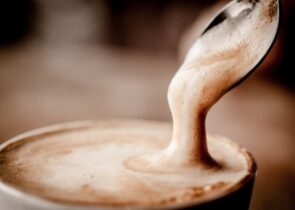There’s a lot more that goes into a great cup of joe than choosing the right coffee. Though the beans you use will decide the direction your flavors go, the water you brew with can make or break your coffee. You might not be as picky about your water as your local barista, but after giving this a read you might change your way of thinking.
If you were anything like me when I first started my homebrew game, you may be feeling frustrated. Why? Because you just got your hands on some high-quality beans. You’ve invested in expensive machinery. And your “cup of mud” actually tastes like mud.
Don’t worry if you aren’t a chemistry wiz. Choosing the best water for coffee can be easy as long as you have basic coffee knowledge and tastebuds. Let’s go over the best choices for coffee water.
At a Glance: Best Water For Coffee
Best Options for Pure Water
It’s now clear that the kind of water you use will impact the flavor of your coffee. How to we get our hands on some purified water? There are a lot of products and gadgets to achieve purity, but we have done a lot of the research for you Let’s review our favorite options for making pure water for coffee:
Quick Summary: Best Water For Coffee
 | Our Top Choice
Brita Ultra Max
| Check on Amazon → |
 | Brondell Circle Reverse Osmosis System | Check on Amazon → |
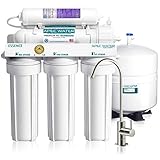 | APEC Top Tier | Check on Amazon → |
 | OnliPure Zero Installation Purifier | Check on Amazon → |
| No products found. | AQUASPREE Exclusive 7 Stafe Alkaline Water Filter | Check on Amazon → |
 | Third Wave Water | Check on Amazon → |
The Brita Ultra Max
Not only is the Brita Ultra Max fairly priced, but it’s also a great size and suitable for a large family. It’s home-kitchen friendly and will fit neatly on your countertop. It will reduce unwanted tastes from your water, and has an electronic reminder for when you need to clean the filter.
Things we like:
- Great size and countertop friendly so you won’t deal with a cluttered kitchen.
- Easy to clean
- Affordable
Things we don’t like:
- Can leak from time to time
- Requires monthly maintenance
- Inconsistent water taste
The Brita Ultra Max will get the job done., and without much hassle. This is a great choice if you just want a simple way to filter your water at home and want to improve your coffee brewing setup.
Brondell Circle Reverse Osmosis System
Another affordable coffee filtration system on our list is the Brondell Circle Reverse Osmosis System. The great thing about this system is that it is easily installed under your sink, so it’s easy to store won’t take up any of that precious counter space.
One main reason we favor this product over other filtration systems is that it requires less water during the purifying process. Not only are you saving your cup of coffee from unwanted additives, but you are saving the world as well!
Things we like:
- Easy to install and easy to use
- Doesn’t take up too much counter space
- Uses less water during purification so you don’t waste any of that good stuff
Things we don’t like:
- Leaks occasionally
- Slow water flow which means more prep time
APEC Water Reverse Osmosis System
Do you prefer your water to be top tier enough to make your coffee brewing experience forever positive? Then look further into this system. Even if you suck at plumbing, this system can be installed with minimal effort.
What’s great about this product is that it automatically adds in all the coffee friendly minerals like calcium into the water supply.
Things we like:
- Low maintenance
- Clean pure drinking water
- Energy efficient
Things we don’t like:
- Leaks occasionally
- Needs a larger space
OnliPure Water Filter
Unlike the previous reverse osmosis systems mentioned above, the OnliPure doesn’t require any installation. This modern designed water filter will make any kitchen look more hip. A very compact system, it fits well in apartments or even campers.
It may be on the more expensive side of this list, but you are going to get super clean and healthy drinking water from this product and that will lead to fantastic coffee.
Things we like:
- Easy to use due to the fact that there is no installation.
- Very energy efficient so it won’t ramp up your electric bill.
- Makes sure your water has all essential minerals.
Things we don’t like:
- It can take up to 20 minutes so it requires a little bit of prep.
- Small reservoir so not the best for large families
AQUASPREE 7 Stage Alkaline Water Filter
No products found.
This electricity-free natural way of purifying water is a great addition to the kitchen counter. This device will rid your water from all toxins and metallic compounds that will compromise your coffee. The use of gravity makes this some of the best water for coffee.
Great for any home, office or even college dorm. Just like the Onlipure, this water filter requires no installation.
Things we like:
- Compact and easy to store in your kitchen or office
- Doesn’t use any electricity
- Lightweight and portable
Things we don’t like:
- Needs to be cleaned regularly
- Water can sometimes leak amongst different levels of the system
Third Wave Water
Third Wave Water is a company that produces a mineral enhanced water additive that is optimized for coffee brewing. This affordable product comes in small packets that almost look like vitamin supplement powders.
They have done all of the testings for you in finding the best balance of minerals to make what you’re brewing taste great. This product works with all coffee machines and is easily stored on the countertop or kitchen cabinet.
It’s really cool to see companies changing the industry up with innovative products like this. It makes the whole process a lot easier to do at home and requires way less equipment.
Things we like:
- Easy to use and time-efficient
- Versatile and goes with any brewing style
- Optimized for coffee
Things we don’t like:
- Need to refill packets
- Can take a while to dissolve depending on the temperature of the water
What does good coffee water taste like?
The best way to answer this without boggling your mind and making you crazy is your water should have a blank or neutral taste. This will really complement the flavors from your coffee beans, and your homemade brew will taste just like your local coffee shops!
In order to understand what’s the best water to use, we need to breakdown the different kinds of water available for brewing coffee.
Is it OK to use distilled water to make coffee?
Distilled water is water that has been boiled to vapor and then condensed back to liquid. This is a common method of purifying water in regions where tap water isn’t safe to drink. Most bottled water is distilled. But distilled water lacks minerals like calcium and magnesium otherwise found in tap water, and these are great allies for coffee.
So is distilled water suitable for brewing coffee? I wouldn’t recommend it because it lacks essential minerals that help to extract the coffee beans into the water.
Tap Water
Using tap water for your coffee can be the easiest solution, but with ease comes sacrifice. As mentioned above, this kind of water contains compounds that can drastically alter the flavor of your coffee. Remember, a high mineral content means more extra flavors, and we want neutral water.
So tap water may be more accessible to you, but all of those minerals are going to restrict the potential of your coffee beans. If you have the patience and the desire to make a great cup of coffee, don’t use tap water. Especially if you hate cleaning your espresso machine.
Bottled Water
If you’re interested in brewing a good cup of coffee without adding any new appliances to your kitchen, then bottled water may be the way to go. However, this can get expensive because now you’re dealing with more packaging. So if you already tend to have a lot of bottled water on hand, I recommend using it.
Remember that not all bottles of water are created equal. Some might hive a higher mineral content than others. The kind of water bottle you choose can alter the taste of your coffee.
Filtered Water
Since most people are using tap water for their coffee brewing, using filtered water will really make your cup of coffee stand out. The filtering process will remove all those nasty acidic compounds and leave you in love with your morning brew.
Using filtered water is not only going to make your coffee taste better, but it’s also better for your health. Unfiltered water contains toxins that can have negative long-term effects on your health.

Hard Water vs. Soft Water
When on the subject of water, there is more than just filtered and unfiltered, or salt and fresh water. We also have hard water and soft water. No, hard water isn’t ice, that was also my first thought.
Hard water
The hardness of water is determined by the amount of calcium and magnesium contained inside. Calcium and magnesium are very coffee friendly minerals. So hard water would contain more of these minerals.
Soft water
Soft water, on the other hand, contains less calcium and magnesium. But soft water is higher in sodium.
So do we use hard or soft water in our coffee? Well, unfortunately, the answer to this isn’t one-sided. Instead of choosing hard or soft, it’s about finding the right balance that you enjoy when sipping your morning coffee.
You may read a lot that you want to soften your water for brewing, but that can give your water a salty aftertaste. However, if your water is too hard you may deal with more bitterness. The right balance depends solely on your preferred taste.
The Difference Between Reverse Osmosis and Distilled Water
In most cases, experts would consider a reverse osmosis (RO) water better than distilled. Though both are considered “filtered water”, RO systems don’t require any electricity and are easier to maintain. This makes them a great addition to your home for long term healthy drinking water. RO systems help by leaving a coffee-friendly mineral content.
How do you know if you have a water problem?
Not every time you come across a bad batch of coffee is the water to blame. Sometimes using the wrong grinder, or choosing the wrong beans can put you in a bad spot.
Since most people neglect the quality of their water when making coffee, they never realize why their coffee tastes worse than their local barista’s – even if they are using the same beans!
- Experiment brewing with different kinds of water – Make about 3 different batches. You can try one with spring water, another with bottled water and perhaps distilled water for the third. This will reassure you that it’s not your beans, but it’s your water.
- Make sure your coffee maker is clean – This may seem like a no-brainer, but some people leave their coffee makers uncleaned and unloved. This can make a huge negative impact on your coffee quality.
- Ask your local barista – Since most people are in the coffee industry are passionate about their products, they don’t mind sharing a tip or two. Ask your barista if you can try the water they use and then compare it with what you have at home.
Often times when people are brewing coffee, they focus too much on the coffee beans and not enough on the whole process. There are a lot of steps that go into a godlike cup of coffee, and you just need to have the patience to spot them out.
To take home…
Coffee is 98% water, so choosing the best kind is essential for brewing a perfect batch. The chemistry behind water may not be all that interesting, but it’s an essential component of the coffee brewing process. I’m a big believer that the more you geek over something, the better outcome you will get. If you really want to make top-notch coffee, you need to look into every detail.
Every good batch of brew starts with good water. As seen above there are tons of cool gadgets you can add to your home to help get the purest water possible. Next time before you start your coffee routine, take a sip of the water you using and if anything tastes off or funky, try going with something different.

